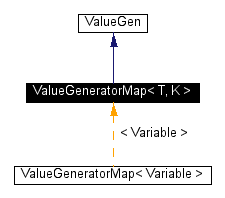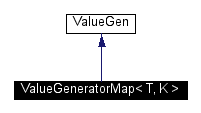
#include <valuegenmap.h>
Inheritance diagram for ValueGeneratorMap< T, K >:


It uses an STL map to provide get and set operations on parameters, and also provides the ValueGen operations, (making it be a ValueGen itself). In fact, this should really be implemented as a ValueGenMap, since it does not really depend on the object types. Unfortunately, Cray's compiler won't currently support clone() for such a case, and thus currently this is restricted to items of a single arithmetic type.
Definition at line 41 of file valuegenmap.h.
Public Types | |
| typedef K | key_type |
| Key type of our local map. | |
| typedef ValueGenerator< T > * | data_type |
| Data element type of our local map. | |
|
typedef std::pair< const key_type, data_type > | value_type |
| Element type of our local map. | |
|
typedef std::map< key_type, data_type > | map_type |
| Type of our local map. | |
| typedef map_type::iterator | iterator |
| Map's iterator. | |
| typedef map_type::const_iterator | const_iterator |
| Map's iterator. | |
Public Methods | |
| ValueGeneratorMap (const ValueGeneratorMap &b) | |
| iterator | begin () |
| Underlying map's begin(). | |
| const_iterator | begin () const |
| Underlying map's begin(). | |
| iterator | end () |
| Underlying map's end(). | |
| const_iterator | end () const |
| Underlying map's end(). | |
| std::pair< iterator, bool > | insert (const value_type &x) |
| Insert into underlying map. | |
| void | set (const key_type &k, const data_type d) |
| Instead of directly using the map's [], which has a tricky semantics, or find, which is cumbersome, map access is handled through named get and set member functions. | |
| void | set_default (const key_type &k, const T d) |
| Set only if not yet set. | |
| T | get (const key_type &k) const |
| Similar to map's [], but returns actual value (not pointer or ValueGenerator), has a default of zero if not found, and never adds a new entry. | |
| T * | getptr (const key_type &k) |
| Similar to [], but adds a new ValueGenerator if the key is not found rather than adding a null pointer. | |
| const data_type | getvalgenptr (const key_type &k) const |
| Deprecated; exposes underlying datatype, e.g. | |
| virtual bool | next () |
| Advance to the next state (whatever that means for this object). | |
| virtual void | reset () |
| Reset to the starting state. | |
| virtual void | relink (const ValueGeneratorMap< T, K > *b) |
| Relink all of the ValueGenerators in this map with those in the given map. | |
| virtual void | merge (const ValueGeneratorMap< T, K > &b) |
| Incorporate ValueGenerators from another map. | |
|
virtual ValueGeneratorMap< T, K > * | clone () const |
| Construct and return an identical copy of self. | |
|
||||||||||
|
Similar to map's [], but returns actual value (not pointer or ValueGenerator), has a default of zero if not found, and never adds a new entry. See Roldan Pozo's C++ notes, lecture 4, for how to implement this as operator[] in a way that will still work with const references. Definition at line 152 of file valuegenmap.h. References ValueGeneratorMap< T, K >::const_iterator, and ValueGeneratorMap< T, K >::end(). |
|
||||||||||
|
Similar to [], but adds a new ValueGenerator if the key is not found rather than adding a null pointer. Unlike get() this returns a pointer to the actual data, and should thus only be used when absolutely necessary. Definition at line 162 of file valuegenmap.h. References ValueGeneratorMap< T, K >::const_iterator, ValueGeneratorMap< T, K >::end(), ValueGeneratorMap< T, K >::insert(), and ValueGenerator< T >::valueptr(). |
|
||||||||||
|
Deprecated; exposes underlying datatype, e.g. for debugging Definition at line 175 of file valuegenmap.h. References ValueGeneratorMap< T, K >::const_iterator, and ValueGeneratorMap< T, K >::end(). |
 1.3-rc2
1.3-rc2